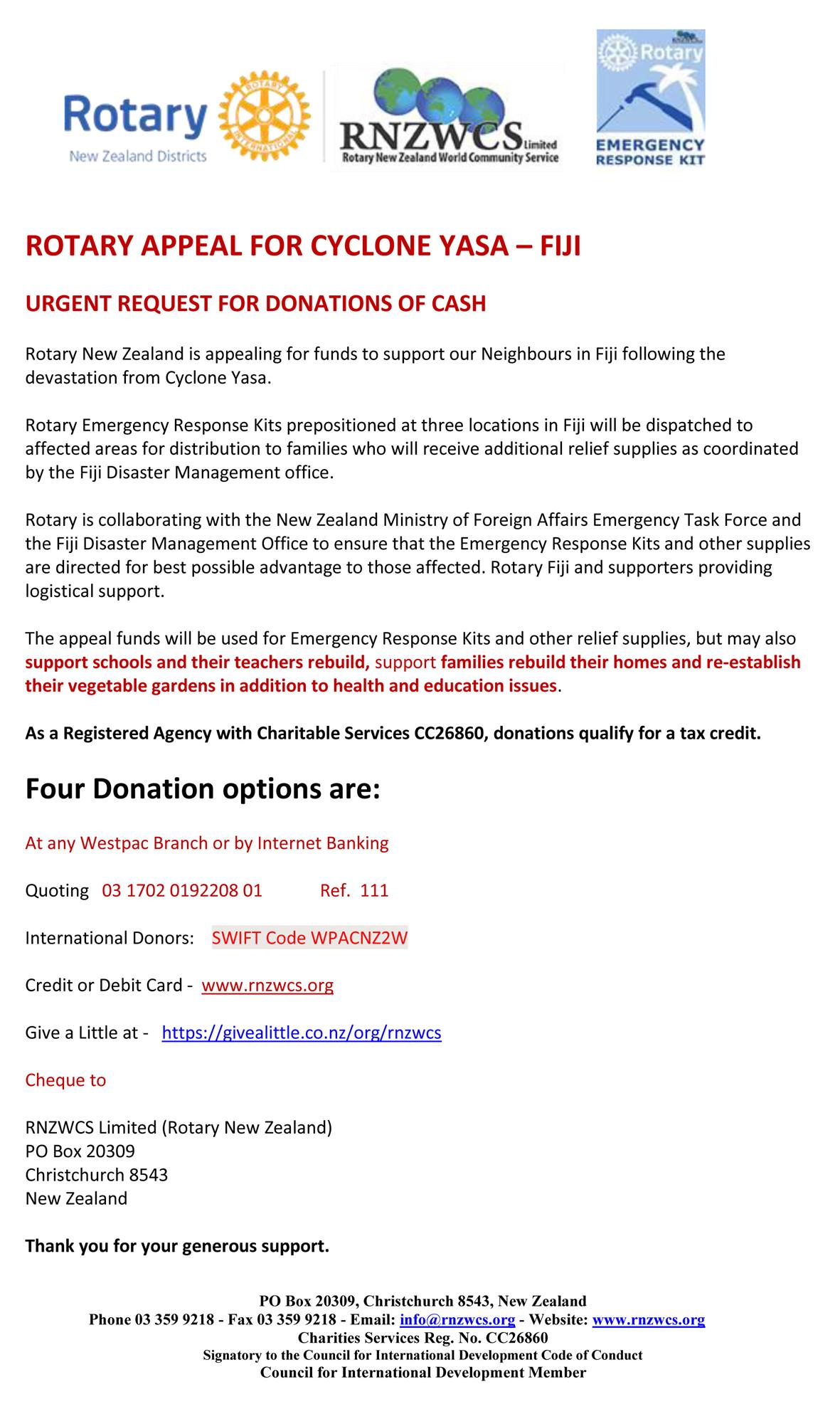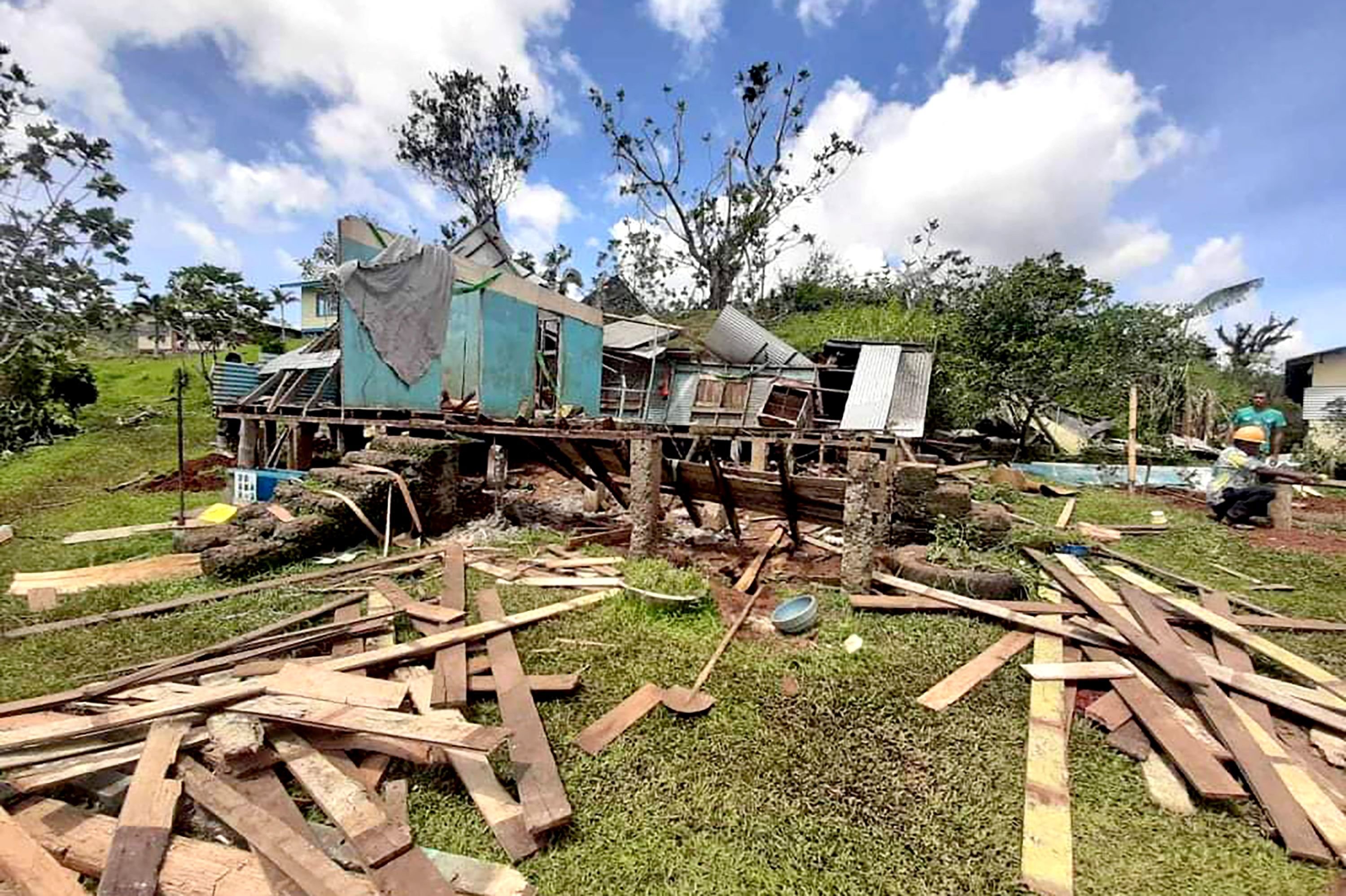After conducting extensive research and analysis, we have compiled this comprehensive guide on the destructive impact of Tropical Cyclone Yasa on Fiji to assist readers in fully understanding the situation.
Key Takeaways:
| Category | Key Takeaway |
|---|---|
| Strength | Category 5 tropical cyclone, the strongest to hit Fiji since 2016 |
| Impact | Widespread destruction of homes, infrastructure, and agriculture |
| Casualties | 4 deaths and numerous injuries reported |
| Aid | International and local organizations providing assistance |
Main Article Topics:
- Strength and Impact of Tropical Cyclone Yasa
- Devastation Caused by the Cyclone
- Casualties and Injuries
- Aid and Recovery Efforts
- Conclusion
FAQs
The destructive Tropical Cyclone Yasa has left devastating repercussions on the Fijian islands. To help address pressing inquiries, here are answers to some frequently asked questions surrounding this catastrophic event.

Rotary Appeal for Cyclone Yasa - Fiji | Rotary District 9930 - Source www.rotary9930.org
Question 1: What are the most pressing needs for the affected communities?
Immediate requirements include shelter, food, clean water, medical assistance, and financial aid for rebuilding efforts. Support organizations are actively seeking donations to provide these essential services.
Question 2: How extensive is the damage to infrastructure?
The cyclone caused widespread destruction to homes, businesses, schools, hospitals, and power lines. Roads and bridges have been severely damaged, hindering access to affected areas.
Question 3: Are there any casualties or injuries reported?
Yes, unfortunately, several fatalities and injuries have been reported. Rescue and recovery efforts are ongoing, but the full extent of casualties is still being assessed.
Question 4: What is the current state of communications and electricity?
Communication networks have been significantly disrupted, making it challenging to reach affected areas. Electricity supply has been extensively affected, and it may take some time for services to be restored fully.
Question 5: How can the international community assist in the recovery efforts?
International organizations and governments are providing humanitarian aid, including financial assistance, medical supplies, and technical support. Donations to relief organizations are crucial for ongoing recovery efforts.
Question 6: What lessons can be learned from Tropical Cyclone Yasa?
This event highlights the importance of disaster preparedness, early warning systems, and resilient infrastructure. It also emphasizes the need for international cooperation and support in responding to such catastrophic events.
The situation in Fiji remains challenging, and ongoing efforts focus on providing relief, assessing damage, and rebuilding affected communities.
For further updates and information on how to support relief organizations, please refer to official sources and reliable news outlets.
Tips to Respond to Tropical Cyclone
Responding to tropical cyclones is crucial for safeguarding lives and property. Here are some recommended actions:
Tip 1: Monitor Weather Forecasts and Warnings
Stay informed by regularly following weather updates from reliable sources. Pay attention to official warnings and evacuation orders.
Tip 2: Prepare an Emergency Plan
Develop a comprehensive plan that outlines evacuation routes, emergency contacts, and necessary supplies. Share the plan with family members and keep it readily accessible.
Tip 3: Secure Your Home and Property
Take precautions to protect your home from wind damage. Board up windows, secure loose objects, and reinforce doors. If possible, move valuable possessions to higher floors or secure them in a waterproof container.
Tip 4: Stock Up on Essential Supplies
Gather non-perishable food, water, first-aid kits, medications, and other essential items. Store them in a designated emergency kit and keep it easily accessible.
Tip 5: Evacuate When Necessary
If ordered to evacuate, do so promptly and follow the designated routes. Seek shelter in a sturdy building or evacuate to a designated evacuation center.
Tip 6: Stay Informed During the Storm
Use a battery-powered radio or mobile device to monitor the storm's progress and any updates from emergency services.
Tip 7: Be Prepared for Power Outages
Power outages are common during tropical cyclones. Have flashlights, extra batteries, and a portable generator on hand to ensure communication and essential services.
Tip 8: Check on Neighbors and Assist if Possible
After the storm passes, check on the well-being of your neighbors, especially the elderly or vulnerable. Offer assistance with cleanup or other needs as necessary.
By following these tips Destructive Tropical Cyclone Yasa Batters Fiji, Leaving Widespread Devastation, individuals can enhance their preparedness and response to tropical cyclones, contributing to the safety and well-being of their communities.
Destructive Tropical Cyclone Yasa Batters Fiji, Leaving Widespread Devastation
Tropical Cyclone Yasa, a Category 5 storm, unleashed its fury upon Fiji, leaving behind a trail of widespread devastation.
- Unprecedented Strength: Yasa's wind gusts reached a staggering 345 km/h, making it one of the strongest cyclones to ever hit Fiji.
- Extensive Damage: Homes, schools, and infrastructure were decimated by the cyclone's relentless winds and heavy rainfall.
- Loss of Life: Tragically, Yasa claimed the lives of four people, leaving families and communities mourning.
- Power Outages: The cyclone disrupted power lines, leaving thousands of Fijians without electricity, hampering communication and recovery efforts.
- Food Shortages: Crops were destroyed, and transportation routes were blocked, leading to food shortages and concerns about food security.
- Community Resilience: Despite the devastation, Fijians demonstrated remarkable resilience, coming together to support each other and rebuild their communities.
Yasa's destructive impact highlights the urgent need for climate adaptation and preparedness measures to mitigate the risks posed by increasingly severe cyclones. The resilience of Fijians in the face of adversity serves as an inspiration for global efforts to address the challenges of natural disasters.

Fiji compared to 'war zone' after Cyclone Yasa devastation | Daily Sabah - Source www.dailysabah.com
Fiji Government - Latest update on Tropical Cyclone Yasa 🌀... - Source www.facebook.com
Destructive Tropical Cyclone Yasa Batters Fiji, Leaving Widespread Devastation
On December 17, 2020, Tropical Cyclone Yasa unleashed its destructive fury on Fiji. As a Category 5 cyclone, Yasa battered the island nation, leaving behind a trail of widespread devastation. The storm's impact was devastating, claiming lives and causing immense damage to infrastructure and property.
kampimage/>
The connection between "Destructive Tropical Cyclone Yasa Batters Fiji, Leaving Widespread Devastation" is multifaceted. The catastrophic impact of the storm highlights the vulnerability of coastal communities to extreme weather events. Fiji's geographical location in the Pacific Ocean makes it particularly susceptible to cyclones and other natural disasters. The intensity and frequency of such events are projected to increase due to climate change, posing significant challenges for island nations.
Understanding the connection between climate change and extreme weather events is essential for developing effective disaster preparedness and resilience strategies. Investing in early warning systems, strengthening infrastructure, and promoting sustainable land-use practices can help mitigate the impacts of future cyclones. Additionally, international cooperation and support are crucial to assist affected communities in rebuilding and recovering from such devastating events.
The table below provides an overview of key insights and practical applications related to the topic:
Conclusion
The devastating impact of Tropical Cyclone Yasa on Fiji serves as a stark reminder of the urgency of addressing climate change and strengthening our resilience to extreme weather events. By investing in sustainable practices, promoting international collaboration, and implementing effective preparedness measures, we can work towards minimizing the risks and consequences of future disasters.
The lessons learned from Cyclone Yasa will continue to guide disaster preparedness efforts in Fiji and other vulnerable regions. The resilience and determination of the Fijian people in the face of adversity demonstrate the importance of community spirit and the power of working together to overcome challenges.
